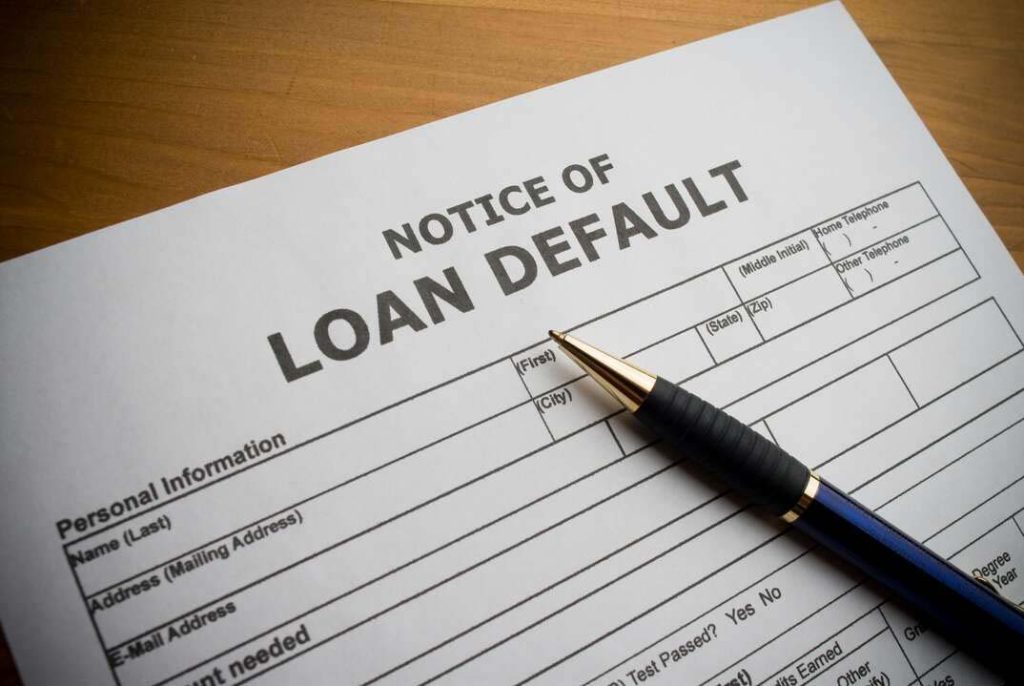Business loans are an amazing tool for entrepreneurs to help scale their businesses.
But it can be risky…
Unfortunately, there are times when you can’t avoid facing financial issues that can cause late payments on your loans.
And if you feel like you’re struggling to repay bills on time, the thought of a business loan default has probably gone through your head.
So here’s what happens if you default on a business loan, the possible consequences, and the solutions:
First off, let me start by saying this:
Defaulting on a loan can have drastic consequences.
And suppose you don’t know what to do. In that case, it can significantly damage your credit scores and potentially cause you to miss out on great opportunities, especially those juicy $100k to a million $ corporate loans that you can use to invest and scale your business.
But don’t worry!
With over 25 years of experience as a financial coach and banking expert, I’ll not just show you what will happen if you default on a loan, but I’ll also tell the #1 secret tip on how to avoid it and the three possible solutions in case that happens
So, let’s get right into it

What is a Business Loan Default?
A business loan default is when the borrower has continuously violated the legal terms of the loan agreement.
When you default on a loan, you have repeatedly missed and failed to repay your debts and have not resolved the situation with your lender.
Your lender knows or thinks you will not repay the loan during this time.
Business loan default vs. delinquency
Your business loan will be considered delinquent before it falls into default.
It is usually considered delinquent when you miss a payment, but it will still depend on your lender and its unique business loan agreement.
Once you’ve missed a payment, lenders may charge you an additional fee. Less strict lenders can offer a grace period, which can be a few days or weeks.
If you can repay your bills, your loan will be released from delinquency.
However, your loan will likely default if you continue to miss payments.
What happens when you default on a small-business loan?
Once you start missing loan payments, lenders will contact you to notify you about the delinquency and try to talk with you to resolve this problem.
Lenders will have the right to seize the debt if you fail to respond to your lender and your loan defaults.
If your small business loan goes into default, expect consequences like:
You Lose Collateral
Collateral is a valuable item you’ve pledged as a safety net or security measure to help secure a loan.
Secured or asset-backed loans typically have lower interest rates than unsecured ones.
If you have a secured business loan, your lender can collect your collateral to regain losses.
For instance, let’s say you own a restaurant and took out equipment financing to buy a refrigerator.
The refrigerator you currently purchase will serve as collateral for the loan, which lenders could seize to recover its loss in the case of default.
You Lose Personal Assets
On the other hand, unsecured loans may not require collateral, but potential lenders may require you to sign a personal guarantee instead.
A personal guarantee gives lenders the right to collect your personal assets to repay the debt in case of loan default.
Lender Sues You
If you can’t repay the debt and refuse to offer your business or personal assets to repay your debts, lenders can press charges against you.
When lenders take legal action, you’re responsible for paying for the outstanding loan balance, interest, additional fees, penalties, court costs, and attorney fees.
During the legal process, the court will determine the right terms for the repayment, which can include allowing lenders to seize your tax refunds or personal bank account to cover the loan.
Lowers Your Credit
When credit scoring companies like FICO calculate your credit score, they consider your payment history the biggest factor.
According to FICO, payment history accounts for about 35% of your FICO scores.
Lenders report your payment history to the credit bureaus.
That’s why your personal and business credit will drop significantly if you miss payments or default on a loan.
How to Avoid Business Loan Default
It will be difficult to recover financially when you default on a business loan.
You’ve not just lost a valued collateral or a personal guarantee. Still, your credit score will have a major impact, making it harder for you to qualify for your next business loan application.
If you think you’re falling behind on your monthly bills or you won’t be able to meet your loan deadlines, here are a few tips on avoiding business loan default.
Evaluate Your Business Finances
Review your finances thoroughly. You may be able to find the root of the problem and help identify the proper solution for continuing to make loan payments.
If you discover that your business lacks cash flow, reexamine your daily expenses and find areas where you can reduce your budget.
But if your problem is with loans with high interest rates, consider opting for business debt consolidation loans.
Debt Consolidation Loan
A debt consolidation loan converts your debts into one loan payment, which helps lower your monthly payment.
Let’s say you’ve taken out two loans, one for $12,000 and one for $7,000. You can apply for a new $20,000 loan and use the funds to pay off your balances on the two loans.
Debt consolidation loans can also help adjust the interest rate and loan terms, helping you to save more money in the long run.
However, if you’re at risk of default and have a damaged credit, it will be harder for you to qualify for a new loan.
Although some lenders are still willing to work with you, expect to pay higher interest rates and fees than traditional secured loans.
Debt Rescheduling
Consult with your lender and ask whether it’s possible to reschedule or restructure your debt to a much more flexible terms and schedule.
For instance, you can ask lenders to extend the loan terms, which will let you pay the loan off over a longer time and help reduce the cost of bills you pay each month.
You can also ask your lender to lower your interest rate or waive unnecessary business loan fees.
Negotiate with your lender carefully, although there’s no guarantee that your lender will adjust things for you.
Consult With A Professional
Working with a business professional such as an accountant or an attorney can help sort your finances out.
These experts can evaluate your situation and devise a personalized plan to manage your repayments to avoid loan default.

What Happens If You Default On A Business Loan: Bottom line
If you’ve recently taken out a loan, ensure you’ll do everything possible to work and avoid defaulting.
A business loan default can cause a massive drop in your credit scores and result in a legal case.
Unable to repay the loan will give lenders the right to seize any agreed collateral. Or if you’ve signed a personal guarantee, lenders can collect their loss from your personal assets, which can even result in bankruptcy.
It’s best advised to continue to work with your lender if you’re close to a loan default rather than working against them.
Ask lenders to reschedule or restructure the debt. Many lenders are very lenient and will be open to helping you out.
Consulting with your lender or a professional can help you minimize the damage to your finances.
